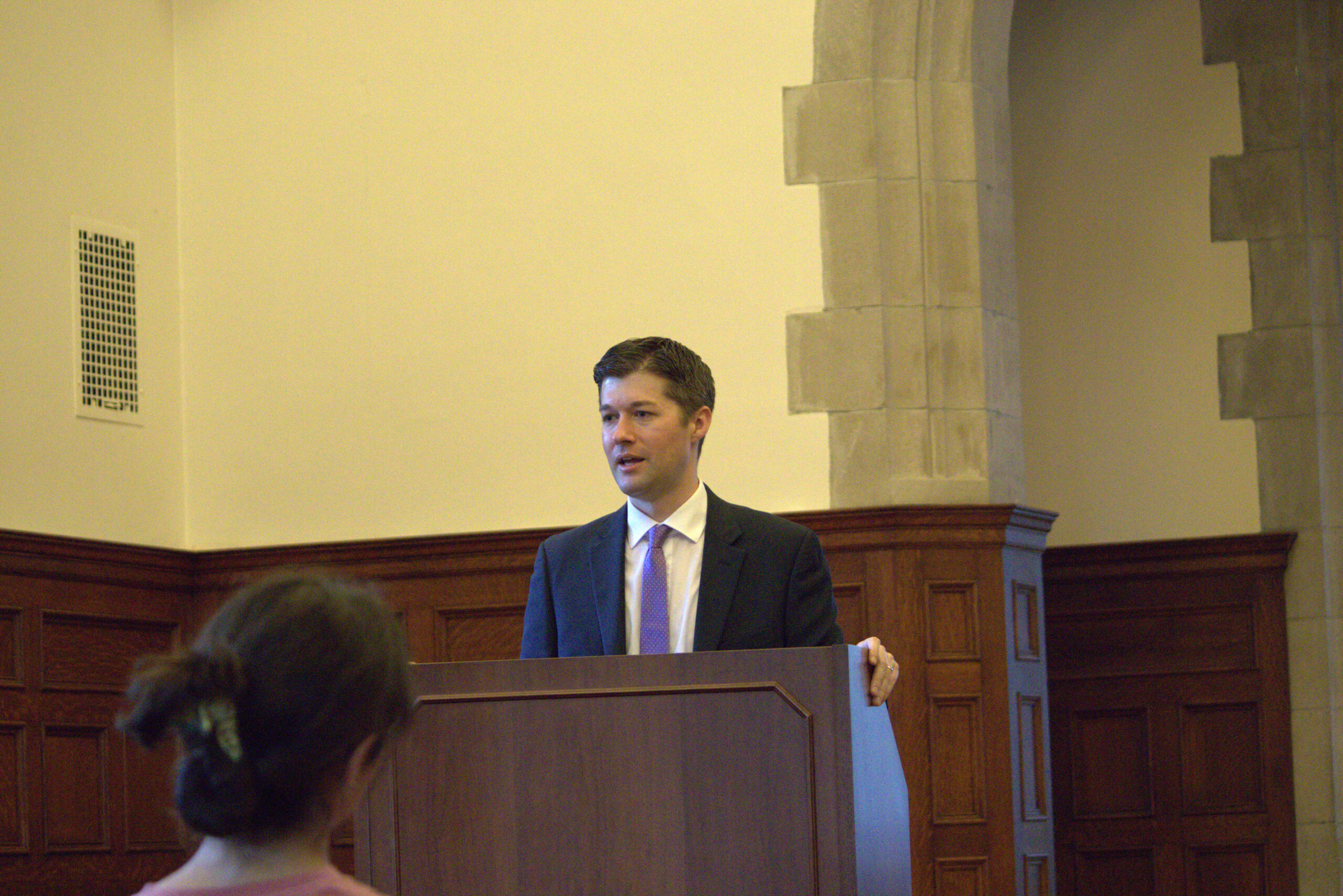Ryan Berg talks Venezuelan politics and elections
October 11, 2024
 Shawn Jiminez
Shawn JiminezLast Monday, September 30, in the Shannon Room of Hubbard Hall, the Eisenhower Forum hosted Dr. Ryan Berg, director of the Americas Program at the Center for Strategic and International Studies, who delivered a lecture entitled “Nicolas Maduro and the Future of Venezuelan Politics.”
Berg began the talk by asserting that the State Department and the foreign policy community at large no longer share a clear consensus on how to approach American relations with Venezuela. Berg noted that, over the past decade, the contrasting Republican and Democratic administrations’ strategies have both done little to change the state of human rights and politics in Venezuela.
“We’re really at a crossroads in terms of policy on Venezuela,” Berg said. “A Republican administration tried a pretty strong policy of sanctions and the recognition of the interim government, and we’ve had a Democratic administration try to use some of that sanctions architecture to get some concessions on democracy, human rights and elections.”
When Venezuela held an election in July, Nicolas Maduro, the current president of Venezuela, used his political power to suppress the opposition, Berg explained. Maduro prevented popular opposition candidates from running, closed polling locations in areas with high opposition support, intimidated voters and fabricated election results. While the government reported a vote of 51% for Maduro and 44% for opponent Gonzales, Gonzales actually had twice as many votes as Maduro, according to the official tally sheet records collected by the opposition.
“Nevertheless, around midnight on election day, the election authorities announced results … that said Maduro is the victor of the election,” Berg said. “Maduro will be inaugurated [on] January 10, 2025 … with results fabricated out of thin air.”
Berg said scholars and diplomats have gained a better understanding of the internal operations of the Venezuelan regime by studying how mafia and other criminal organizations operate. He argued that the Venezuelan government operates more like a criminal enterprise than a traditional government.
“We’re talking about the use of the army for massive amounts of drug trafficking. We’re talking about human trafficking. We’re talking about illicit gold mining in areas where key government figures are involved in their own mines and so on, and these are all revenue generators,” Berg said.
The criminal structure of the regime, Berg says, forces government officials to work together to maintain the status quo. The officials recognize they can only continue to engage in illicit activities without consequence if they stay in power.
“The regime has survived, not on the basis of its economic legitimacy, not on the basis of its democratic legitimacy, but mostly on the basis of this criminality,” Berg said.
Berg also discussed the current effects of the slow economic decline that began in Venezuela in the early 1990s under the presidency of Hugo Chavez. Today, more than eight million refugees have fled, many of them seeking asylum in the United States.
“What happens in Venezuela doesn’t stay in Venezuela,” Berg said. “I’m talking about the eight million or so who have had to leave [for] another life elsewhere, and the nurturing of a bunch of other criminal organizations that then fan out to the rest of the continent.”
Marysabela Abunassar ’28, a Venezuelan refugee, attended the talk hoping to learn about potential ways to address the crisis, but left without any clear solution.
“I agree with what [Berg] said but … I’m leaving, and I’m feeling the same because, if he says we’re stuck, then what the heck’s gonna happen?” Abunassar said.
Attendee Jake Medina ’28 emphasized a desire to continue the discussion with a focus on future steps toward finding a solution.
“I don’t feel like any external efforts will actually help, given everything that’s been going up until now,” Medina said. “It was a good summary, but it wasn’t a good conversation about strategy for what should come next.”
Editors Note on October 23 at 3:30 p.m.: An earlier version of this article mistakenly attributed a quote to Vanessa Partida-Saucedo ’28 and falsely described Partida-Saucedo as a Venezuelan refugee. The quote was actually said by Marysabela Abunassar ’28, who is a Venezuelan refugee and attended this lecture.

Comments
Before submitting a comment, please review our comment policy. Some key points from the policy: